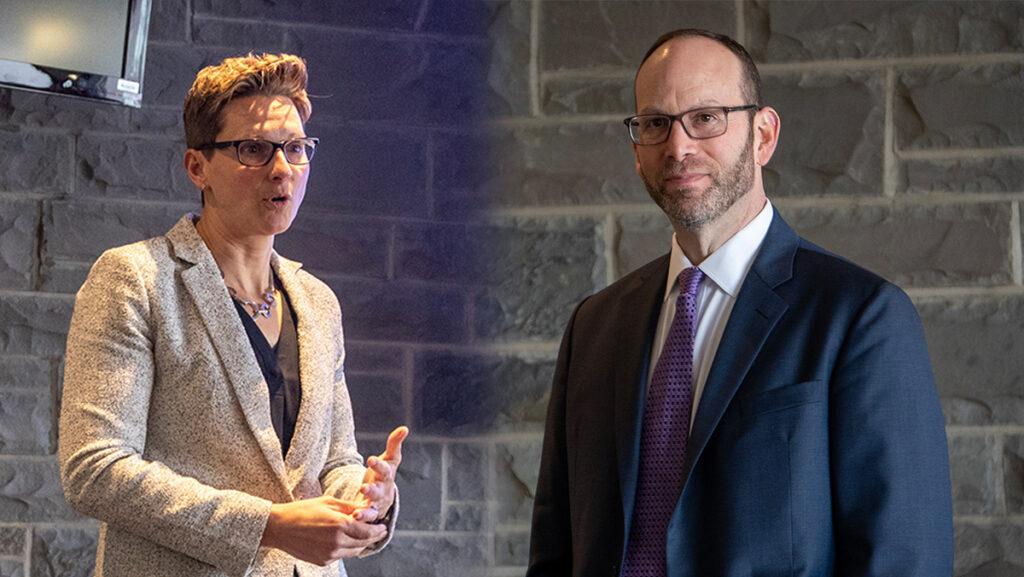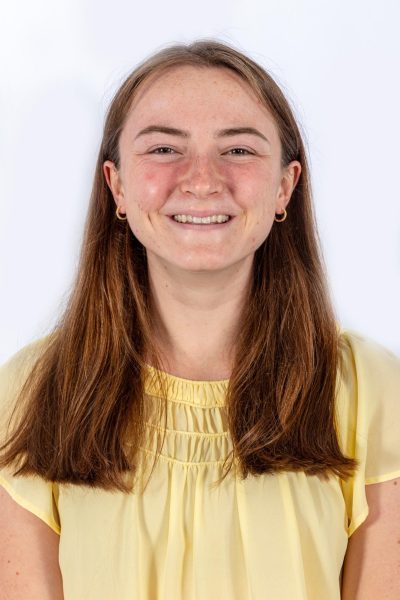Three finalists for the position of vice president for enrollment and student success visited Ithaca College from March 27–29 to speak with members of the campus community.
The new position will lead the Division of Enrollment and Student Success, which comprises the Office of Admissions, the Office of Student Financial Services, the Office of Constituent Engagement Strategy, the Office of Analytics and Institutional Research, the Center for Career Exploration and Development and the Center for Student Success and Retention. The selected candidate will begin in the role during summer 2023.
The college partnered with NES Searches, an executive search company that helps higher education institutions find candidates specifically for enrollment leadership positions. NES is currently facilitating 11 searches across its entire company, including the vice president for enrollment and student success for the college.
Each of the three finalists for the position conducted three sessions for staff, faculty and students, respectively, in Klingenstein Lounge in the Campus Center and the Founders Room in the Peggy Ryan Williams Center.
Candidate 1: Kishan Zuber
Kishan Zuber is the current vice president of Slate Strategy and Partnerships for Waybetter Marketing, a national, higher education enrollment marketing company. Zuber has held seven different positions in enrollment and marketing since 2007; none for longer than four years. She has worked in New York in several enrollment management positions at Wells College, Binghamton University and Delhi College of Technology. She also worked in marketing at Southern Tier Athletics. Zuber said that in these positions, she learned how to make the most of limited resources to increase enrollment.
“You have to be scrappy,” Zuber said. “You’ve got to try different things and you’ve got to be creative, especially if you don’t have necessary resources.”
In response to questions about social media and current marketing tools, Zuber said there is room for improvement.
“I just can’t get a sense of place in a couple of clicks [on the website],” Zuber said. “It should at least have given me some semblance of what this place is like and make you want to visit so I don’t think we’re leveraging that.”
Zuber said the college’s current communication with interested students is very general and does not target students’ intended majors or areas of study. Zuber said the college should maximize its available data and personalize its marketing to appeal to students’ specific desires for their college experiences. Zuber also said the college should add more information and photos to the college website to demonstrate the reasons to attend the college.
In her cover letter, Zuber said she read the Ithaca Forever strategic plan with great enthusiasm. During the faculty session, Zuber addressed the hardships higher education employees and students have undergone in the past few years and how that impacts enrollment and marketing.
“There’s a lot of opportunity here to build on some success we’ve already started to have,” Zuber said. “There’s been some hard decisions that already happened. How do we keep, then, moving forward? There’s some low-hanging fruit and I might be crazy, but it’s kind of an exciting time to be in higher ed in the sense that, when there’s pain, people are willing to change and look at new things. And higher ed might need some reimagining to be able to serve students today, tomorrow and 10 years from now.”
Football head coach Michael Toerper asked Zuber to pinpoint the most compelling reasons for students to make a financial commitment to attend the college. Zuber said the college should do more to emphasize its internships and experiential learning opportunities, like the Ithaca College Los Angeles program, in marketing advertisements to show potential students that attending the college would prepare them to enter a career field.
“I think the value here is actually the connection to industry,” Zuber said. “I think that students — the consumer — [are] really looking for, ‘What am I going to get out of this?’ And that’s a retention thing, too, because if they don’t know what the goal is … then retaining them is so much harder. Being able to make those connections early and in the recruitment phase really matters.”
Candidate 2: Bryan Gross
Bryan Gross, vice president for Revenue Planning and Institutional Positioning at 3 Enrollment Marketing, said he wants to be part of a campus community again after working as a consultant with 3 Enrollment Marketing since 2022. In the past, Gross has held admissions and enrollment leadership positions at Western New England University in Springfield, Massachusetts; St. John’s University in New York City; and the University of Bridgeport, Connecticut.
Bryan Roberts, associate dean for the Roy H. Park School of Communications, said the college’s recent trends in revenue and enrollment are not ideal and wanted to know how Gross has worked with institutions when there was a decision that he did not agree with.
“We need a change agent; someone who understands the data but someone who can speak truthfully and honestly to the board of trustees [and] to the president’s cabinet,” Roberts said.
Gross said that several years ago at Western New England University, the board of trustees was interested in pursuing a tuition reset which Gross did not think was the best decision. He said he engaged the board in discussion and presented data about how enrollment and revenue were impacted at schools that had a tuition reset.
“I am absolutely an advocate for what I believe in, especially when data supports things,” Gross said. “I’m not a big fan of this term of ‘best practices.’ … What worked really well, for instance, at Western New England University or St. John’s, it’s not necessarily going to work here. … I really do use a gap analysis framework when it comes to trying to identify a problem accurately and then implement intervention.”
Kelly Stern, director of enrollment and marketing, asked Gross how he would work with schools to develop academically inclusive marketing strategies. Gross said he thinks the college should include faculty in marketing strategies and engage them in content creation.
“We have to develop a plan together about how we’re going to engage students in a really modern, future-forward way that speaks to them in a highly personalized and customized way,” Gross said. “You have one to three seconds to capture [students’] attention with an ad-like piece of information.”
Throughout the sessions, Gross highlighted several potential ideas for increasing enrollment and retention, including personalized and consistent marketing; immediately connecting career advisers with new students; focusing on student support and equity; and building more opportunities for students to find belonging. He said the college’s athletics play an important part in the college’s early enrollment and retention and wants to look at athletics as a model for other types of teams.
“We know that COVID-19 has derailed a lot of students, especially their sense of purpose,” Gross said. “I think there’s an opportunity to think — outside of athletics — what other teams we could create for students and to bring students on board early in the admissions process.”
Candidate 3: Jacob Browne
Jacob Browne, dean of admissions at Eckerd College in Florida, has worked at Eckerd since 2014. He previously served as the director of admissions. During his time at Eckerd, applications increased by 40% and enrollment increased by 10%. Browne also worked as the director of admissions and the director of recruitment at Wagner College.
Browne said he prefers stability and does not frequently consider job positions. However, he said he was immediately drawn to the position at Ithaca College because the college dedicates resources to student success and retention.
Browne said the college can work to increase applications, but it should primarily focus on increasing the yield rate, the percentage of accepted students that actually enroll at the college. Browne said that based on the current website and marketing, it could be difficult for prospective students to determine why students should attend the college; there is no clear advantage that separates the college from other schools.
“It is difficult to find those differentiators right now for Ithaca, other than you’ve got a fantastic communications department,” Browne said. “You’re placing students in great internships, and they’re able to go to Los Angeles or London. And maybe those are the differentiators. … There are other schools and universities that have really strong communications departments. And you’ve got a great commitment to health, physical therapy, physician assistant, but there are other schools that do that as well.”
Jeff Golden, associate vice president of Auxiliary Services, asked Browne about which new and existing enrollment techniques most effectively increase enrollment.
Browne said traditional search strategies, like buying names from the PSAT, are starting to be phased out because they do not recognize all of the qualified potential students that colleges could be recruiting. Additionally, they do not reveal which students have expressed interest in the college, which leaves a wide pool of potential students to try and attract.
“Students are searching colleges in a different way,” Browne said. “Niche.com is a great resource. … A lot of students are using it for their college search process. And so you can partner with Niche and they will provide you names and they also do a lot of digital remarketing and retargeting ads.”










